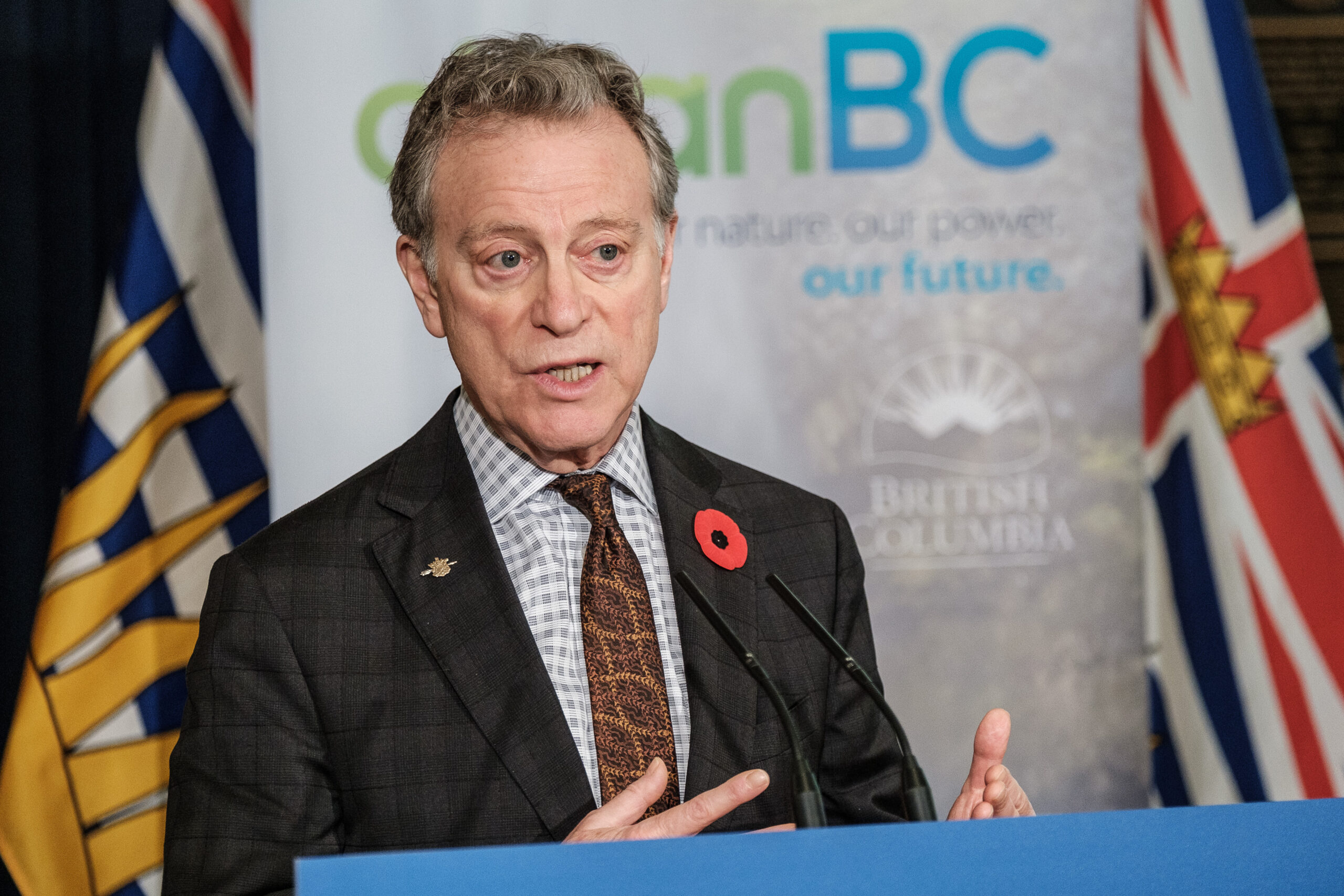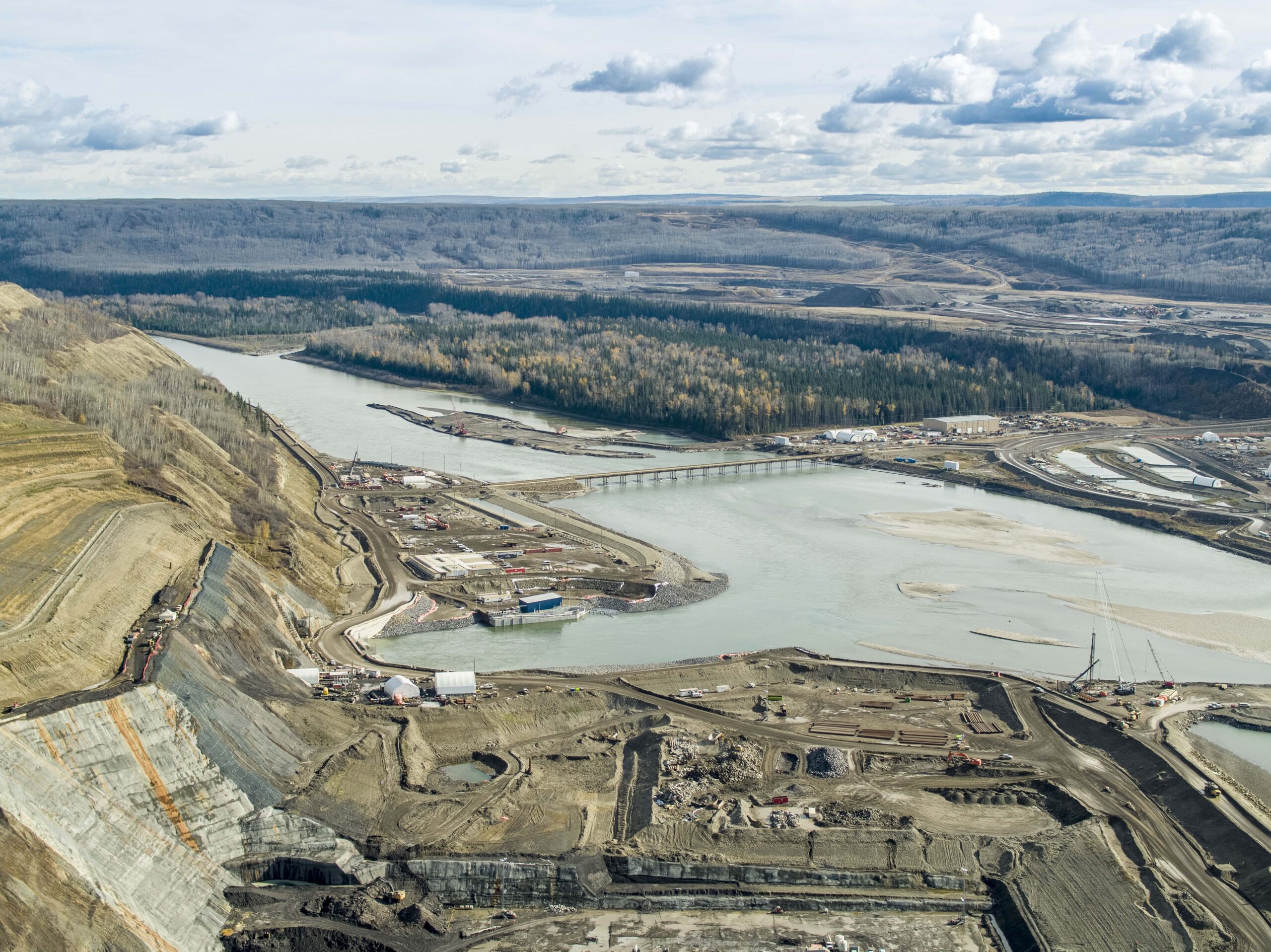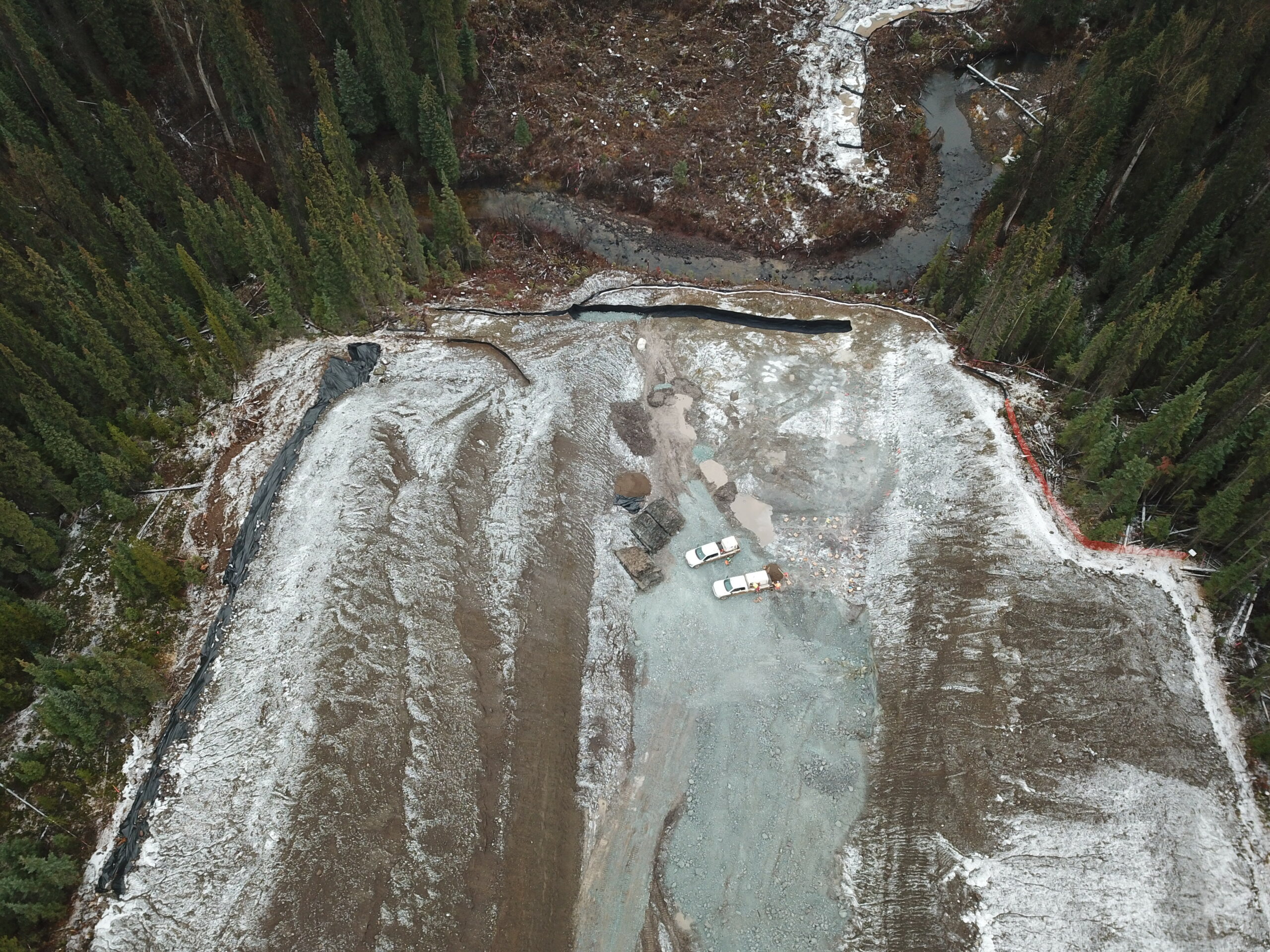
What’s scarier for Canadian communities — floods, or flood maps?
When maps showing areas most likely to flood are outdated, it puts people and property...
For more than a decade, successive B.C. governments have thrown their hats behind an industry hellbent on getting gas out of the ground and across the Pacific to Asian markets.
LNG Canada, a liquefaction and export facility under construction in Kitimat, is poised to be the first project to do so. As the facility inches closer towards a goal of firing up operations in 2025, its partner companies are eyeing investment for an approved expansion, which would double the amount of gas processed at the plant.
The plan is to power that second phase by burning gas — at least at first. The export project is approved to use its own gas to run massive compressors that cool the fossil fuel to -162 C, reducing its volume for shipping. The moment it flips the switch to start operations of its first phase, running at half its potential capacity, it will become B.C.’s single largest emitter of carbon pollution.
Phase two, which could come online as early as 2030, would send B.C. emissions skyrocketing. Running at full capacity, the operation would produce around 13 megatonnes of emissions annually, more than 20 per cent of B.C.’s total emissions in 2020.
“We are in a climate emergency. We cannot afford to expand fossil fuel infrastructure and miss key emissions targets,” Sonia Furstenau, leader of the B.C. Greens, said in a statement. “LNG phase one already made it practically impossible to meet our CleanBC goals. LNG phase two makes it a pipe dream.”
CleanBC is the province’s plan to lower emissions by 40 per cent by 2030 and reach net-zero by 2050.
As LNG Canada tries to entice investors, its project partners are looking into ways to rely more on electricity instead of gas.
Teresa Waddington, vice president of corporate relations with LNG Canada, told The Narwhal it has a team dedicated to exploring options, which could include redesigning expansion plans to eventually replace the gas turbines with electric motors.
While electrification would reduce emissions from the LNG export facility, it wouldn’t eliminate them. And powering the project would divert energy away from other sectors, Merran Smith, executive director of Clean Energy Canada, explained in an interview.
“If they were going to try to reduce their emissions using electricity, and they did that upstream, along the pipeline and at the plant, they would need about two Site Cs worth of electricity,” Smith said, noting demand for hydro is only going to increase as B.C. shifts to reduce carbon pollution in line with its climate plan.
“We’re going to have to make choices,” she said. “We’ve also heard from the B.C. government that new industry needs to fit within the CleanBC plan. The B.C. government needs to be clear: What does it mean by those words?”
When B.C. gave LNG Canada a green light in 2015, its approval was for both phases — with or without electrification. The province’s climate plan was unveiled three years later, setting ambitious targets. The current goal is to reduce emissions to 40 per cent below 2007 levels by 2030, scaling up to 80 per cent by 2050. It also set a sectoral target of 33 to 38 per cent reductions by 2030. All of these goals are relevant to LNG Canada, which has an estimated lifespan of 40 years.
B.C.’s Ministry of Environmental and Climate Change Strategy confirmed future LNG projects have to align with B.C.’s climate commitments — but stopped short of explaining how phase two fits into that equation.
“At this time, LNG Canada’s phase two project has not reached a final investment decision,” a ministry spokesperson wrote in an email. “Construction on phase one of the project is ongoing and is not expected to be complete until 2025.”

Tom Green, senior climate policy advisor with the David Suzuki Foundation, said B.C. needs to rethink its position on the project.
“It’s time for a reset,” he told The Narwhal. “Climate science is telling us that each additional tonne of carbon in the atmosphere is a tonne we can very ill afford.”
Green said it’s disappointing to hear the original plans to power the second phase with gas are going ahead, despite CleanBC targets.
“Meanwhile, we have had the experience of how bad climate change is affecting British Columbians,” he said, noting the 2021 heat dome, in which 619 people died. “If you look at the social cost of carbon … we’re impoverishing ourselves with each tonne of LNG that we export.”
Smith said the province’s climate targets only accounted for LNG Canada’s initial operations and Woodfibre LNG, another proposed export facility.
It’s unclear why B.C. didn’t factor the expansion into its climate strategy, but Green suggests it might be because there’s no way to reconcile the vast increase in emissions with provincial reductions goals.
“British Columbia hasn’t revised its legislative targets, probably in part because it knows it’s in such a pickle because of its commitment to the LNG industry,” he said.
Jason Klein, LNG Canada’s CEO, said the company is taking a phased approach to using electricity because transmission lines haven’t been built.
“We can’t do an immediate and wholesale electrification of the plant and the pipeline,” he told Reuters earlier this month. “If the power was there today it would be a pretty straightforward decision.”
Waddington said any changes to the current plan are contingent on government support. Acknowledging federal and provincial emissions reduction targets, she noted electrification would need both governments to be on board to “help facilitate the power and transmission necessary to make it a viable option.”
“The overall competitiveness of our project does not rest on emissions reductions alone.”
Teresa Waddington, LNG Canada
Green worries governments will be coerced into further subsidizing the project, which has already received billions in financial support through a suite of tax breaks and incentives.
“I think the big risk here is that B.C. and Canada are going to continue with public financing and concessions, not insisting that LNG Canada phase two or future projects use electric drive and be the lowest possible emissions,” he said. “Instead, they’re going to allow them to undermine our climate targets and then we’re going to end up with stranded assets and worsen the climate emergency. None of it makes much sense.”

It appears the province is already putting the wheels in motion to supply more power to the project.
On Jan. 19, BC Hydro CEO Chris O’Riley said the Crown corporation is starting the process to increase transmission capacity to Terrace, B.C., less than an hour north of Kitimat.
“This is a really important infrastructure initiative for us,” he told attendees at the B.C. Natural Resources Forum in Prince George. O’Riley didn’t specifically name LNG Canada in the announcement, but he noted industrial demand for hydro is increasing.
“While we currently have enough transmission capacity to serve the existing and committed load in the north coast, and we’ve got room to spare, we do have an unprecedented queue of potential customers that have applied for service and these are mines and LNG projects, port facilities and the like.”
B.C.’s Ministry of Environment and Climate Change Strategy confirmed in an email that LNG Canada is one of those potential customers.
“BC Hydro is aware of the proponent’s request for a connection to the electricity grid to run operations for the proposed second phase of the project,” a ministry spokesperson wrote. “BC Hydro is assessing multiple scenarios for economic growth in northern B.C.”

Smith said the financial burden shouldn’t be on taxpayers, noting fossil fuel companies have deep enough pockets to pay for the hydro infrastructure.
“They’re not a sector that needs a subsidy,” she said. “They’re a sector that’s making significant profits right now and they should be investing their profits into carbon reduction strategies.”
Like most oil and gas companies operating in Canada, Shell, LNG Canada’s biggest shareholder, earned record profits in 2022, posting a $9.49 billion profit in its third quarter, more than double what it took in the year before.
Global markets, in part due to Russia’s invasion of Ukraine, set the stage for all this profit and are fuelling a renewed push to get gas out of the ground and to buyers overseas.
Waddington said the LNG Canada project “represents a tremendous opportunity for our country to contribute a reliable supply of low-carbon LNG to the world at a seminal moment for global energy security.”
Earlier this month, Japanese Prime Minister Fumio Kishida was in Ottawa for talks about trade and the current energy crisis. According to reporting by The Globe and Mail, Kishida’s cabinet secretary for public affairs said LNG Canada will replace the gas Japan imports from Russia. Japanese company Mitsubishi, an automotive manufacturer that also controls more than half of that country’s gas imports, has a 15 per cent stake in LNG Canada.
But whether countries like Japan will need B.C. gas by the time the second phase comes online is up for debate. According to the International Energy Agency’s latest report, demand for natural gas is expected to taper over the coming decade as countries implement more aggressive climate strategies.
Even if LNG Canada can switch to electric motors to power its phase two compressors, that doesn’t mean the project won’t contribute to the climate crisis.
After the gas is shipped overseas, it has to be warmed up, put back into pipelines, shipped to buyers and burned to produce energy. And in B.C., emissions produced during liquefaction only account for some of the greenhouse gases that end up in the atmosphere. To get the gas from sources in the northeast, it first has to be fracked out of shale deposits and transported through the contentious Coastal GasLink pipeline.
“The fossil fuels get burned at the destination and there’s methane emissions all along the chain,” Green said.

Methane has a warming potential of around 85 times that of carbon dioxide over a 20-year period. The Intergovernmental Panel on Climate Change has said it’s imperative to cut methane emissions by a third before 2030 to keep global warming from reaching catastrophic levels.
“It’s now or never, if we want to limit global warming to 1.5 C,” Jim Skea, co-chair of the panel, said last year. “Without immediate and deep emissions reductions across all sectors, it will be impossible.”
B.C.’s environment ministry said in a statement to The Narwhal it has set aggressive targets to address methane emissions.
“The CleanBC Roadmap includes a range of actions to ensure the oil and gas sector meets its sectoral emissions target, including mandating a 75 per cent reduction in methane emissions from the sector by 2030, and nearly eliminating it by 2035, as well as significant supports for electrification of the sector.”
Supplying electricity to meet the energy-intensive demands of gas liquefaction comes with a slew of environmental implications.
For example, hydroelectric reservoirs also emit methane. And as vast areas are flooded to create those reservoirs, such as those slated to be submerged by Site C, existing natural carbon storage locked in forests and wetlands is lost.
BC Hydro maintains it can meet the demands of LNG Canada.
“LNG Canada’s power needs can be met with BC Hydro’s existing electricity generation, and this can be done with or without Site C,” Mora Scott, spokesperson with the Crown corporation, told The Narwhal.
Smith said she suspects that doesn’t take into account the projected demands of an increasingly electrified society, nor the full scope of the project.
“We need to choose what we want that electricity to go to and I would suggest that we want to be powering industries that are going to be growing,” she said. “All evidence is that the LNG sector is one that will be declining in 2040 and 2050, whereas things like mining for metals and minerals for battery production, these are industries that will be growing.”
Green said investing in the fossil fuel industry is increasingly a losing proposition.
“Every barrel of oil you extract, every 1,000 cubic meters of gas you extract, once it’s burned, you’ve got to go and do it again,” he said. “When you put up a solar farm or a wind farm and set up the grid and put in place the storage, that’s an asset that keeps generating energy.”
Enbridge Gas will face Waterloo Region in a hearing before the Ontario Energy Board to renew an agreement that would allow the company to continue...
Continue reading
When maps showing areas most likely to flood are outdated, it puts people and property...

We’re suing the RCMP for arresting a journalist on assignment for The Narwhal. It’s an...

As glaciers in Western Canada retreat at an alarming rate, guides on the frontlines are...